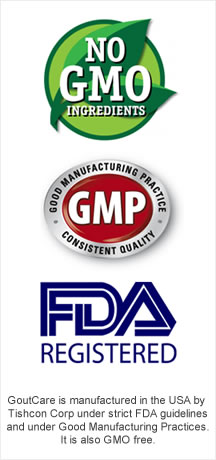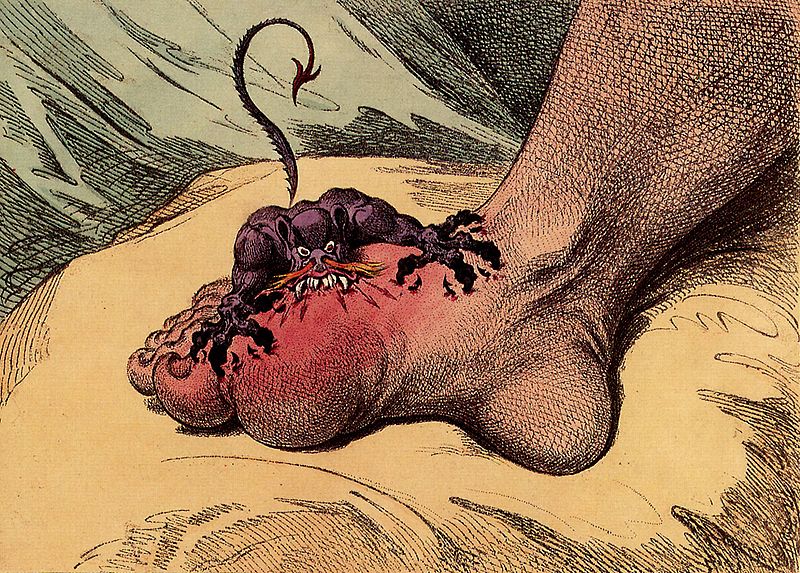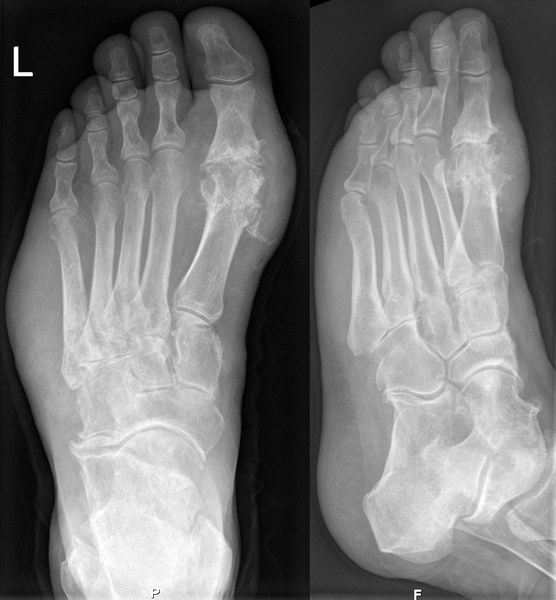 | Gout Factsheets12 Key Factors that Influence Gout Download PDF Consumption * Obesity * Overly Acidic and Purine Rich Diet * Crash Dieting & High Protein Diet * Stress * Prescription and OTC Medications * High Blood Pressure * Diuretics * Antibiotic & Friendly Bacteria. * Chlorine Water Intake & Source * Illness / Injury / Surgery * Gout Awareness Are you aware of how you may have developed Gout in the first place? Contrary to belief, gout is no longer limited to age and gender and has been on the rise in recent decades continuing to reach epic proportions. Still little is being done to help educate, treat, or prevent Gout's crippling effects on the body. Please look over some of the contributing factors involved in its development. This may shed some light on how you may be suffering despite possibly not fitting the typical profile.
Gout, a 1799 caricature by James Gillray. Picture from the Wikimedia Commons. Low Kidney Clearance can be due, as much, to too much water as well as too little. Both these extremes can cause an imbalance in the body creating more strain on the kidneys and preventing them from filtering the waste product from the blood efficiently. Indeed too little water or de-hydration can cause the blood vessels to constrict causing blood flow problems which in turn also hamper the kidneys ability to work efficiently. Other factors influencing kidney function can be some prescription and over the counter medication. The kidneys work rather like a sieve filtering the waste products from the blood. In the case of “Gout sufferers” the increased uric acid, in the blood, puts the kidneys under strain and they are unable to remove all the uric acid allowing it to be passed around the body and stored in the joints and soft tissue where it starts to crystallize, instead of being removed and excreted from the body through the bowels or as urine. The blood is responsible for carrying the uric acid to the kidneys and then to the urine and bowels in order to be disposed. Lack of blood flow allows for any crystallized uric acid to remain trapped and inhibits the soluble amount from being expelled of properly in order to avoid the storage and crystal formation. The Liver is the take all for foreign invaders in the body. As the largest gland it is responsible for food metabolism, bile secretion, removal of waste from the blood, toxin filtering, blood volume control, and the synthesizing of essential vitamins and nutrients. When the liver, and kidneys for that matter, have so many other toxic encounters to deal with daily, then something as natural and necessary as uric acid can become one of the last matters to deal with. Any reduced function of both can greatly add to uric acid imbalance and excretion adding a higher possibility of gouty arthritis formation. Now let us look at how some other contributing factors add to pressure to the kidneys, liver, and blood flow. Alcohol consumption requires the attention of the liver and kidneys hindering proper uric acid expulsion. Alcohol not only dehydrates the blood responsible for carrying the uric acid through and out of the body, but it is also rich in purines further producing excessive uric acid. Obesity which can affect the heart, blood flow, friendly bacteria levels and nutrient assimilation places excess strain on these same organs and functions. As a result, extra uric acid production is common and even more so from the typical diet involved in obesity cases as well as the lack of secretion from this stress placed on all areas responsible for the filtering. Even without the presence of obesity, the typical diet is overly acidic and purine rich. We know that uric acid is the waste product from the breakdown of purines and purines are the metabolic end result of protein. So too many purines equal too much uric acid production with not nearly enough exits from the body has to result in storage somewhere in the body.
Gout on X-rays of a left foot. Typical location at the big toe joint. Note also the soft tissue swelling at the lateral border of the foot. Picture from the Wikimedia Commons.
Acidic/Alkaline balance in the diet, particularly within each meal, is essential to normal function and control of all areas involved. To achieve this balance it is said that at least a 70/30 ratio of alkaline to acidic intake is key. Our typical modern diet is exactly the opposite and in many cases even worse finding mostly a 20/80 ratio.
Spiked rods of uric acid (MSU) crystals from a synovial fluid sample photographed under a microscope with polarized light. Formation of uric acid crystals in the joints is associated with gout. Picture from the Wikimedia Commons. High Blood Pressure & Diuretics are some of the top nutrient depleting drugs on the market so it is important to try and at least supplement some vitamins and friendly bacteria during their use. High Blood Pressure Diuretics can add even more concern regarding Gout as they tend to drain too much water from the blood leaving room for much higher uric acid concentrations. The lack of proper water intake daily adds fuel to the fire. Not only is there too much water being pushed from the body, but not nearly enough going in to replace thus remaining properly hydrated, once again leaving any hopes of proper uric acid excretion minimal at best. It is important to be very aware of your water intake daily. When gout occurs due to another condition such as renal disease it is called Secondary Gout. This is also very common with conditions such as High blood pressure and Diabetes. Other common contributors to Secondary gout can be synthetic diuretic usage as detailed above, low dose aspirin use which limits the excretion of uric acid, and high dose Niacin use prescribed for High Cholesterol Oddly enough, adult dose aspirin does not have the same negative effect in altering the excretion of uric acid as does the commonly prescribed low dose amount of 81mg.
Over 70% of your immune system is in your digestive system and low friendly bacteria counts place a lot of strain on your system's ability to fight infection and disease growth. In fact disease growth flourishes in an acidic and toxic environment which is exactly what happens without enough friendly bacteria present to rule the intestines. Unfortunately, all of the above contributing factors to gout also directly effect and kill this much needed good bacteria in the body. Stress, obesity, medications, overly acidic diets, processed foods, sugar, alcohol, chlorinated water and many more all add to the demise of our good bacteria.
Water consumption and the source for your drinking water is very important. Unfortunately a good portion of our society is dehydrated and isn't even aware of it, which poses major health risks. With relation to Gout in particular, proper water intake is an essential key to blood hydration and kidney filtration in order to properly expel uric acid from the body. Important Notice: You should always seek a Healthcare professional’s advice regarding gout and uric acid levels. Information and statements regarding our dietary supplement (GC) have not been evaluated by any statutory or professional body and the information provided is not intended to be used to diagnose, treat, cure or prevent any disease. If you have a medical condition, or are taking a prescribed medication please consult with your Doctor. Goutcare products (GC) are provided to promote joint health and general well being as part of a healthy and active lifestyle. Dietary food supplements should be taken in conjunction with, and not as a substitute for a healthy lifestyle and balanced diet.
|
.png) Need help? Call 02922 680224
|



